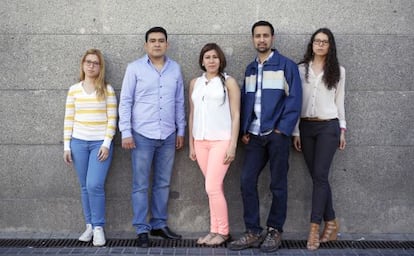The Venezuelan students abandoned to their fate in Madrid
Restrictions at home have left hundreds of youngsters unable to access foreign currency

Six months ago, Jindy Morales left her native Venezuela to come to Madrid to study television and film production, using her hard-earned savings to pay her board and lodging. But like many other students from the South American country studying abroad, she has now been told by the banking authorities there that she cannot exchange the national currency, the bolívar. “We did everything we were told to do, but now I don’t even have enough money to eat,” says the 29-year-old.
Morales requested foreign currency before leaving Venezula. But four months ago she was told that her request was being looked into. Since then, she has been unable to withdraw any money from her account.
Venezuela’s central bank is low on foreign currency, which is making life difficult for students overseas
In short, Venezuela’s central bank is low on foreign currency, which is making life difficult for students overseas. On Friday, the Venezuelan government passed further measures restricting the use of foreign currency, among them a $2,000 limit on credit cards for trips overseas of more than eight days.
“We left our country to study, but we are now close to being homeless. There is a €1,300 limit for essentials, but our requests are being ignored. We are not asking for anything that isn’t ours. We just want our money,” says Henry Sosa, president of the Association of Venezuelan Students in Spain, set up to highlight the plight of young people abroad unable to access funds in their bank accounts.
We left our country to study, but we are now close to being homeless. We are not asking for anything that isn’t ours. We just want our money”
The Venezuelan government has a list of so-called priority study courses. If a student chooses to attend studies abroad, but his or her subject is not on that list, he or she will not be allowed foreign currency. Even in the case of courses on the priority list, students are only allowed a maximum of $1,000 a month
But as is now happening, the central bank is preventing students whose studies have effectively been approved by the government from accessing the foreign currency they need to live abroad. “To all intents and purposes, the government is saying to students, ‘Go, but at your own risk’,” says Vicente Carrasquero, a lecturer in Political Science at the Simon Bolívar university in Caracas.
Some Spanish colleges have already refused to allow students to continue their courses because they have not paid their fees, while others are sleeping rough. Many have had to resort to feeding themselves at soup kitchens. Church groups have also stepped in to help the students.
Some of these students are desperate: they have nowhere to live and nothing to eat. The international community must know what is happening”
William Cárdenas, a Venezuelan lawyer based in Madrid, has offered to help the students by contacting the Venezuelan consulate in Madrid, and has called on the European Union and the UN High Commissioner for Human Rights to act. “Some of these students are desperate: they have nowhere to live and nothing to eat. The international community must know what is happening,” says Cárdenas.
Iván Simonovis-Pertiñez, one of the affected students, has made a 12-minute video called A la deriva (Adrift) telling his and other students’ stories (below, in Spanish with English subtitiles).
The video A la deriva, by Venezuelan Iván Simonovis-Pertiñez.
Tu suscripción se está usando en otro dispositivo
¿Quieres añadir otro usuario a tu suscripción?
Si continúas leyendo en este dispositivo, no se podrá leer en el otro.
FlechaTu suscripción se está usando en otro dispositivo y solo puedes acceder a EL PAÍS desde un dispositivo a la vez.
Si quieres compartir tu cuenta, cambia tu suscripción a la modalidad Premium, así podrás añadir otro usuario. Cada uno accederá con su propia cuenta de email, lo que os permitirá personalizar vuestra experiencia en EL PAÍS.
¿Tienes una suscripción de empresa? Accede aquí para contratar más cuentas.
En el caso de no saber quién está usando tu cuenta, te recomendamos cambiar tu contraseña aquí.
Si decides continuar compartiendo tu cuenta, este mensaje se mostrará en tu dispositivo y en el de la otra persona que está usando tu cuenta de forma indefinida, afectando a tu experiencia de lectura. Puedes consultar aquí los términos y condiciones de la suscripción digital.








































